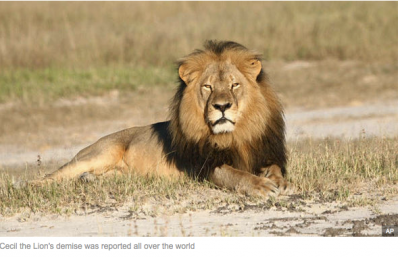|

LionAid would like to take this opportunity to respond to a number of statements made in a recent publication with the above title in “Conservation Letters” by a group of Panthera Foundation scientists concerning the benefits of lion trophy hunting as a conservation tool.
The very first sentence in the publication states this:
“Trophy hunting is widely used in Africa to generate funding for wildlife areas”.
This is just not the case, and we really need to be clear about this. Trophy hunting in Africa:
- has not benefited the conservation of wildlife in hunting concessions,
- has not benefited the alleviation of rural poverty for local communities,
- has not prevented bushmeat poaching or commercial ivory poaching,
- has only contributed to emptying hunting concessions of wildlife.
The authors then mention that “trophy hunting is contentious and much of the media discourse is emotional and polarized, focusing on animal welfare and debating the value of hunting as a conservation tool.”
In other words, it’s all about emotion rather than science? In which case the authors should show us the science that indicates that trophy hunting is actually a proven conservation tool. Not the economics, the real science – in other words how trophy hunting has benefited the conservation of wildlife in trophy hunting areas.
That evidence is very much missing. Sure, we have lots of information about how much trophy hunting contributes to various pockets (not the communities), but no evaluation of how wildlife populations in concession areas fare under a regime of trophy hunting offtake.
The authors then state:
“With or without trophy hunting, Africa’s wildlife areas require much more funding to prevent serious biodiversity loss. In light of this, we urge a shift away from perpetual debates over trophy hunting to the more pressing question of “How do we fund Africa’s wildlife adequately?”
The authors have for years and years supported the concept of trophy hunting as a viable measure to conserve wildlife. Now these same authors require a different formula, while “shifting away from debates”. The past trophy hunting formulas have not provided any benefit to wildlife conservation – so therefore why is the onus placed back on us who oppose trophy hunting to fund alternative means of conserving African wildlife?
To give the authors credit, they spend a considerable number of paragraphs indicating that trophy hunting has serious limitations as a conservation tool. They state, for example, that “trophy hunting frequently fails to generate enough income to manage wildlife land effectively … there is often a failure to reinvest in the management of hunting areas … state wildlife authorities have failed to devolve sufficient benefits from hunting to local communities … the conservation value of hunting is undermined by corruption, which allows unscrupulous operators to continue accessing and depleting hunting areas … for certain species, and notably lions, excessive quotas and unselective offtakes have resulted in adverse population impacts …” etc.
Overall, not a good record of trophy hunting is it?
So what do the authors propose?
Certainly not a cessation of trophy hunting. But a call to others to do better.
“There is an urgent need for the world to find alternative funding streams to reduce reliance of African countries on trophy hunting and to protect wildlife from human pressures… “Cecil-gate” could be used as a justification by [international] governments to increase aid for conservation in Africa … Recent global movements to preclude trophy hunting, for example, have been characterized by lack of realistic suggestions for alternative income streams…”
To me, this article is in some sense apologetic of the pro-hunting stand held by all the authors in the past but then puts the onus of alternative wildlife conservation solutions back on the world public. The authors do not explicitly acknowledge that trophy hunting as a conservation measure has largely failed but instead urge all to take additional financial measures to ensure that wildlife will continue to survive.
The authors conclude that
“Cecil-gate highlighted incredible global passion for African wildlife. The conservation community must capture that passion in a way that generates sustained funding for conservation on the continent and to urgently mitigate ongoing catastrophic losses of wildlife and wild lands.”
I agree. But let’s have a scientific evaluation of how the trophy hunting = conservation formula failed.
Oxford Univesity/WildCRU gained over £780,000 after the death of Cecil. The Panthera Foundation and their associated National Geographic Big Cats Initiative were recently promised $80 million for conservation. Let us all hope that such huge funds will contribute to a realistic way forward to conserve lions. With such donor generosity, let’s have an independent and verifiable assessment of whether viable lion populations continue to exist on any trophy hunting concession. Let’s finally have an evaluation of whether trophy hunting benefitted lion conservation?
And then let’s move forward to do the right thing for lions.
|




